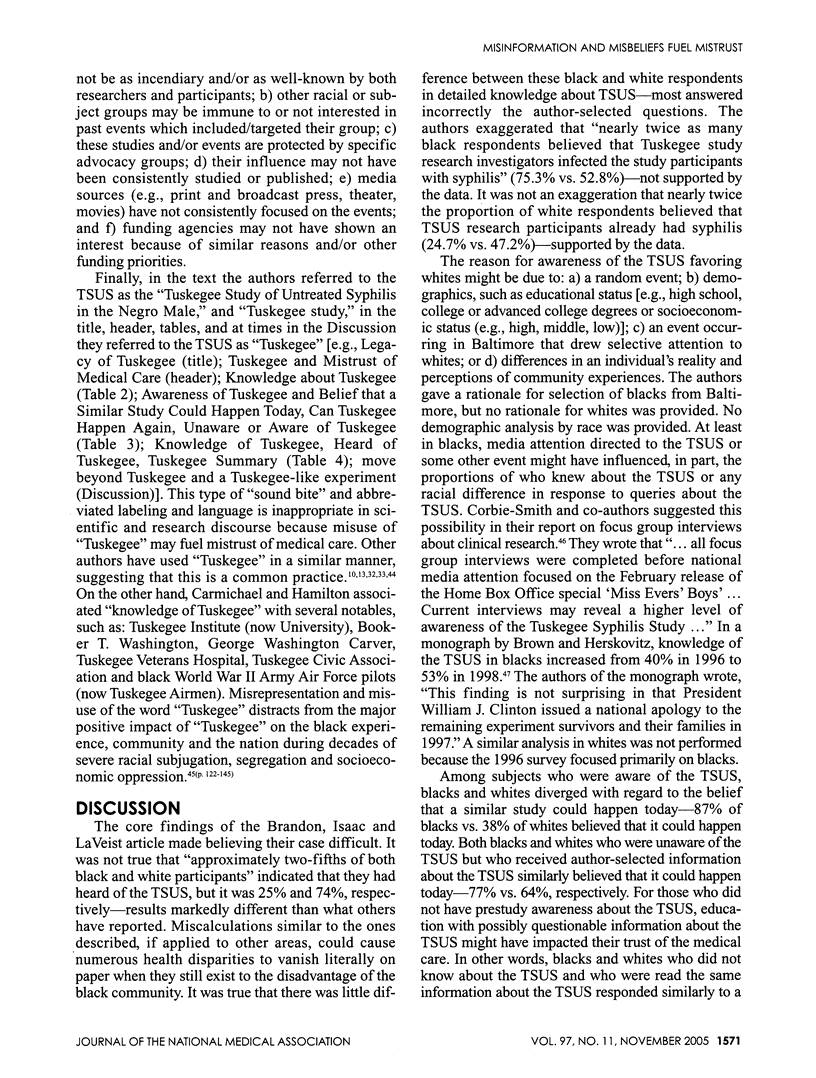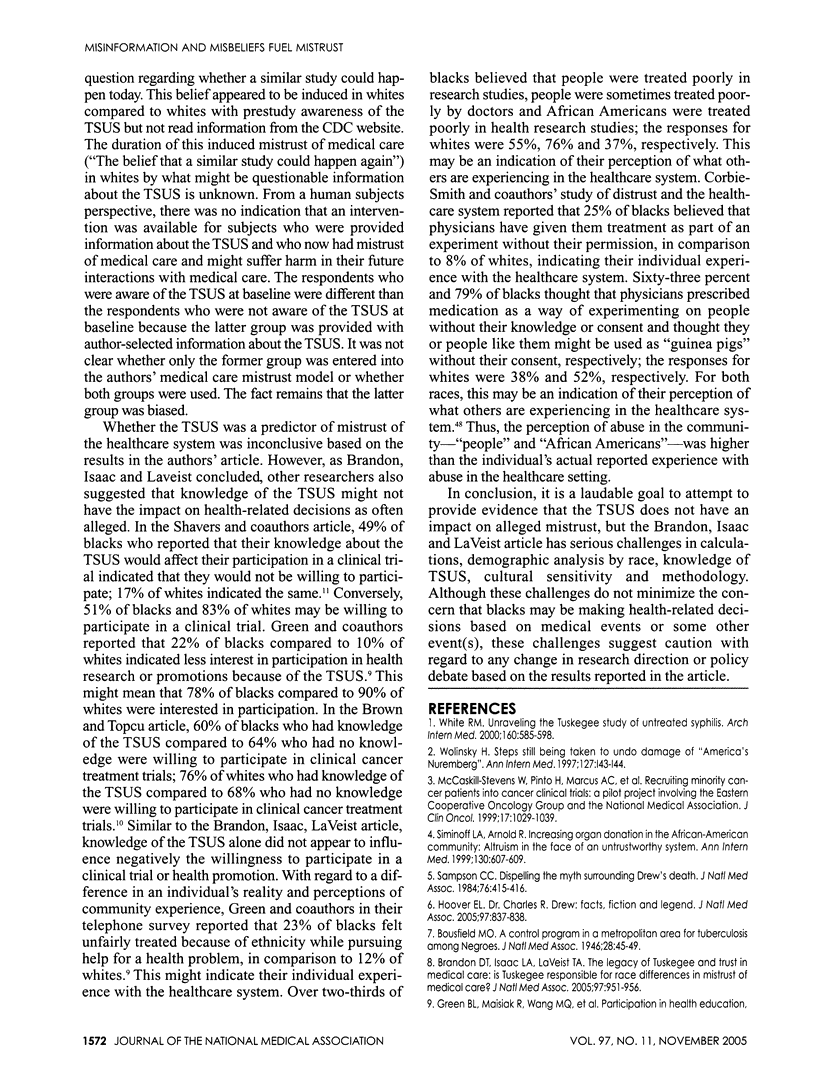Abstract
The Tuskegee Study of Untreated Syphilis (TSUS) is an important issue in research, healthcare, ethics and race relations. The assumed consequences of knowledge of this study on the African-American community include mistrust of the healthcare system. In the July 2005 issue of the Journal of the National Medical Association, Brandon, Isaac and LaVeist (the authors), who were at the Center for Health Disparities Solutions, Johns Hopkins Bloomberg School of Public Health, reported the results of black-white differences in awareness of and knowledge about the TSUS and the effect of that awareness and knowledge on medical mistrust. The study surveyed blacks, whites and others in the Baltimore, MD community about their knowledge of and attitudes about the TSUS. The respondents who were aware of the TSUS were asked survey items to assess specific factual information about the TSUS. The respondents who were not aware of the TSUS were read a brief description of the TSUS taken from the CDC website. Both groups were asked if a similar study was possible today. The authors performed a regression analysis of mistrust of medical care based on race, knowledge of the TSUS and demographic variables. The editorial identified and explained challenges in the article, i.e., challenges in calculations, demographic analysis by race, knowledge of TSUS, cultural sensitivity and methodology. The authors miscalculated the "similar proportions" of blacks and whites who were aware of the TSUS; the recalculated proportions, favoring whites, were different than reported by others. There was no demographic analysis by race in their article--also different than other published reports. Most respondents--blacks and whites--who were aware of the TSUS at baseline answered incorrectly the author-selected questions about the TSUS, particularly the fact-based question of whether the TSUS researchers gave syphilis to the men-not dissimilar to one other report. The source for TSUS information (the CDC website) that was used to educate respondents who were not aware of the TSUS at baseline had contradictions, errors and challenges in black history, medical and public health history, and women's studies. The content of what was actually read to respondents was unknown. Proportionally more whites who were not aware of the TSUS but who were read author-selected information about the TSUS believed that a similar study could happen today-a belief and possibly mistrust of medical care that appeared to be induced-compared to whites with prestudy awareness of the TSUS but not read information from the CDC website. Both black groups were not dissimilar from each other. The authors used a survey that measured a race difference in response to a medical event (TSUS) specific to only one racial group (blacks) when there were inclusive examples specific to other groups available. The authors used "Tuskegee" as a single-word sound bite for the TSUS--a misuse that was inappropriate in scientific and research discourse and that may fuel mistrust of medical care. Whether knowledge of the TSUS was a predictor of mistrust of the healthcare system was inconclusive based on the results in the authors' article. The core findings of the article made believing their case difficult. The editorial suggested that bias and misinformation in undertaking, analysis and reporting the study may in itself fuel mistrust in medical care in the community. Because of these challenges, the editorial urged caution with regard to any change in research direction or policy debate based on the results reported in the article.
Full text
PDF







Selected References
These references are in PubMed. This may not be the complete list of references from this article.
- ALEXANDER L. Medical science under dictatorship. N Engl J Med. 1949 Jul 14;241(2):39–47. doi: 10.1056/NEJM194907142410201. [DOI] [PubMed] [Google Scholar]
- Barondess J. A. Medicine against society. Lessons from the Third Reich. JAMA. 1996 Nov 27;276(20):1657–1661. doi: 10.1001/jama.276.20.1657. [DOI] [PubMed] [Google Scholar]
- Betancourt Joseph R., Green Alexander R., Carrillo J. Emilio, Ananeh-Firempong Owusu., 2nd Defining cultural competence: a practical framework for addressing racial/ethnic disparities in health and health care. Public Health Rep. 2003 Jul-Aug;118(4):293–302. doi: 10.1016/S0033-3549(04)50253-4. [DOI] [PMC free article] [PubMed] [Google Scholar]
- Brandon Dwayne T., Isaac Lydia A., LaVeist Thomas A. The legacy of Tuskegee and trust in medical care: is Tuskegee responsible for race differences in mistrust of medical care? J Natl Med Assoc. 2005 Jul;97(7):951–956. [PMC free article] [PubMed] [Google Scholar]
- Brooks K., Fessler B. J., Bastian H., Alarcón G. S. Sociocultural issues in clinical research. Arthritis Rheum. 2001 Apr;45(2):203–207. doi: 10.1002/1529-0131(200104)45:2<203::AID-ANR174>3.0.CO;2-#. [DOI] [PubMed] [Google Scholar]
- Brown Diane R., Topcu Meral. Willingness to participate in clinical treatment research among older African Americans and Whites. Gerontologist. 2003 Feb;43(1):62–72. doi: 10.1093/geront/43.1.62. [DOI] [PubMed] [Google Scholar]
- Carmeli Daphna Birenbaum. Prevalence of Jews as subjects in genetic research: figures, explanation, and potential implications. Am J Med Genet A. 2004 Sep 15;130A(1):76–83. doi: 10.1002/ajmg.a.20291. [DOI] [PubMed] [Google Scholar]
- Cave V. G. Proper uses and abuses of the health care delivery system for minorities with special reference to the Tuskegee syphilis study.?20V. J Natl Med Assoc. 1975 Jan;67(1):82–84. [PMC free article] [PubMed] [Google Scholar]
- Collins W. E., Jeffery G. M. A retrospective examination of sporozoite- and trophozoite-induced infections with Plasmodium falciparum: development of parasitologic and clinical immunity during primary infection. Am J Trop Med Hyg. 1999 Jul;61(1 Suppl):4–19. doi: 10.4269/tropmed.1999.61-04. [DOI] [PubMed] [Google Scholar]
- Corbie-Smith G., Thomas S. B., Williams M. V., Moody-Ayers S. Attitudes and beliefs of African Americans toward participation in medical research. J Gen Intern Med. 1999 Sep;14(9):537–546. doi: 10.1046/j.1525-1497.1999.07048.x. [DOI] [PMC free article] [PubMed] [Google Scholar]
- Corbie-Smith Giselle, Thomas Stephen B., St George Diane Marie M. Distrust, race, and research. Arch Intern Med. 2002 Nov 25;162(21):2458–2463. doi: 10.1001/archinte.162.21.2458. [DOI] [PubMed] [Google Scholar]
- Coughlin S. S., Etheredge G. D., Metayer C., Martin S. A., Jr Remember Tuskegee: public health student knowledge of the ethical significance of the Tuskegee Syphilis Study. Am J Prev Med. 1996 Jul-Aug;12(4):242–246. [PubMed] [Google Scholar]
- Gallagher-Thompson Dolores, Solano Nancy, Coon David, Areán Patricia. Recruitment and retention of latino dementia family caregivers in intervention research: issues to face, lessons to learn. Gerontologist. 2003 Feb;43(1):45–51. doi: 10.1093/geront/43.1.45. [DOI] [PubMed] [Google Scholar]
- Hoover Eddie L. Dr. Charles R. Drew: facts, fiction and legend. J Natl Med Assoc. 2005 Jun;97(6):837–838. [PMC free article] [PubMed] [Google Scholar]
- LaVeist Thomas A. Disentangling race and socioeconomic status: a key to understanding health inequalities. J Urban Health. 2005 Jun;82(2 Suppl 3):iii26–iii34. doi: 10.1093/jurban/jti061. [DOI] [PMC free article] [PubMed] [Google Scholar]
- MAGNUSON H. J., THOMAS E. W., OLANSKY S., KAPLAN B. I., DE MELLO L., CUTLER J. C. Inoculation syphilis in human volunteers. Medicine (Baltimore) 1956 Feb;35(1):33–82. doi: 10.1097/00005792-195602000-00002. [DOI] [PubMed] [Google Scholar]
- McCaskill-Stevens W., Pinto H., Marcus A. C., Comis R., Morgan R., Plomer K., Schoentgen S. Recruiting minority cancer patients into cancer clinical trials: a pilot project involving the Eastern Cooperative Oncology Group and the National Medical Association. J Clin Oncol. 1999 Mar;17(3):1029–1039. doi: 10.1200/JCO.1999.17.3.1029. [DOI] [PubMed] [Google Scholar]
- OLANSKY S., HARRIS A., CUTLER J. C., PRICE E. V. Untreated syphilis in the male Negro; twenty-two years of serologic observation in a selected syphilis study group. AMA Arch Derm. 1956 May;73(5):516–522. doi: 10.1001/archderm.1956.01550050094017. [DOI] [PubMed] [Google Scholar]
- PESARE P. J., BAUER T. J., GLEESON G. A. Untreated syphilis in the male Negro; observation of abnormalities over 16 years. Am J Syph Gonorrhea Vener Dis. 1950 May;34(3):201–213. [PubMed] [Google Scholar]
- Patsdaughter C. A., Christensen M. H., Kelley B. R., Masters J. A., Ndiwane A. N., Paatsdaughter C. A. Meeting folks where they are: collecting data from ethnic groups in the community. J Cult Divers. 2001 Winter;8(4):122–127. [PubMed] [Google Scholar]
- ROCKWELL D. H., YOBS A. R., MOORE M. B., Jr THE TUSKEGEE STUDY OF UNTREATED SYPHILIS; THE 30TH YEAR OF OBSERVATION. Arch Intern Med. 1964 Dec;114:792–798. doi: 10.1001/archinte.1964.03860120104011. [DOI] [PubMed] [Google Scholar]
- SCHUMAN S. H., OLANSKY S., RIVERS E., SMITH C. A., RAMBO D. S. Untreated syphilis in the male negro; background and current status of patients in the Tuskegee study. J Chronic Dis. 1955 Nov;2(5):543–558. doi: 10.1016/0021-9681(55)90153-3. [DOI] [PubMed] [Google Scholar]
- Shavers V. L., Lynch C. F., Burmeister L. F. Knowledge of the Tuskegee study and its impact on the willingness to participate in medical research studies. J Natl Med Assoc. 2000 Dec;92(12):563–572. [PMC free article] [PubMed] [Google Scholar]
- Shavers Vickie L., Lynch Charles F., Burmeister Leon F. Racial differences in factors that influence the willingness to participate in medical research studies. Ann Epidemiol. 2002 May;12(4):248–256. doi: 10.1016/s1047-2797(01)00265-4. [DOI] [PubMed] [Google Scholar]
- Siminoff L. A., Arnold R. Increasing organ donation in the African-American community: altruism in the face of an untrustworthy system. Ann Intern Med. 1999 Apr 6;130(7):607–609. doi: 10.7326/0003-4819-130-7-199904060-00023. [DOI] [PubMed] [Google Scholar]
- White R. M. Unraveling the Tuskegee Study of Untreated Syphilis. Arch Intern Med. 2000 Mar 13;160(5):585–598. doi: 10.1001/archinte.160.5.585. [DOI] [PubMed] [Google Scholar]


